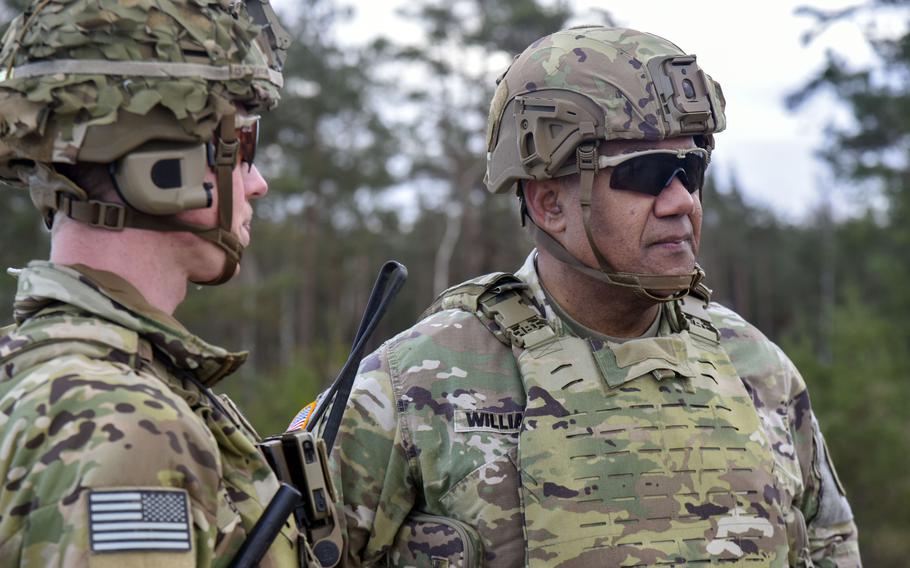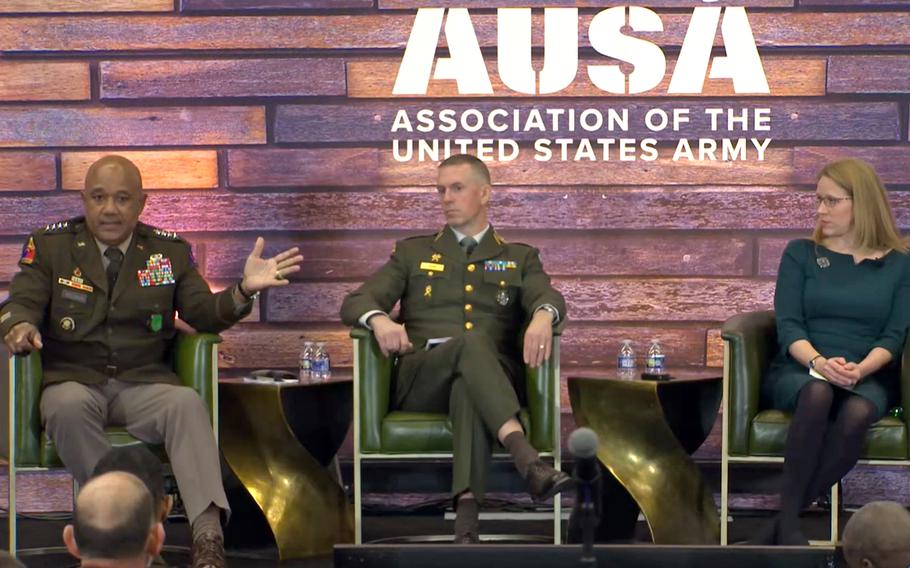
Gen. Darryl Williams, U.S. Army Europe and Africa commander, observes troops at Grafenwoehr Training Area, Germany, Jan. 24, 2024. Speaking at the Association of the U.S. Army’s annual conference in Washington on Oct. 15, Williams said that Russian operatives working inside NATO member nations have upped the risk of a military escalation with Moscow. (Micah Welch/U.S. Army National Guard)
The U.S. Army’s top general in Europe warned this week that Russian operatives making mischief in NATO territory have ratcheted up the risk of military escalation with Moscow.
“The miscalculation piece is as high as it’s ever been,” U.S. Army Europe and Africa’s Gen. Darryl Williams said Tuesday.
Williams, speaking at the Association of the U.S. Army’s annual conference in Washington, said he couldn’t go into much detail about the situation. However, he described the operatives as nontraditional and not “classically trained.”
Since Russia’s 2022 attack on Ukraine, U.S. military officials have raised concerns about the lack of systems in place during the Cold War that helped Washington and Moscow read each other’s signals and avoid nuclear conflict.
Williams’ assertion suggests Russian operatives lack the grasp of allied red lines that their Soviet predecessors had.
“We could tumble into this thing because of the people that are currently snooping around Europe and causing mischief in all of our backyards,” Williams said.
Williams said allies need to prepare for the long-term when it comes to countering the threat posed by Russia, which despite heavy losses in Ukraine continues to reconstitute its forces, ramp up defense spending and crank out munitions with an industrial base on a wartime footing.

Gen. Darryl Williams, U.S. Army Europe and Africa commanding general, left, talks during a panel discussion at the Association of the United States Army annual convention, Oct. 15, 2024, in Washington, D.C. Next to Williams are Maj. Gen. Jonny Lindfors, chief of the Swedish army, and Dara Massicot, of the Carnegie Endowment for International Peace. (Screenshot/DVIDS)
Beyond Ukraine’s borders, there are growing concerns about Russian activity rippling into NATO member nations.
On Monday, German officials highlighted a previously undisclosed incident that occurred in July in the eastern city of Leipzig, where a package caught fire at a DHL logistics center before being loaded onto a cargo plane. The Germans said the action was suspected Russian sabotage.
There have been other causes for alarm.
“We are seeing sabotage across Europe,” said Jack Watling, a ground warfare expert with the Royal United Services Institute in London, who joined Williams on panel discussion about NATO security matters.
Numerous acts of arson, the attempted assassination of an industrial leader in Europe and various information operations aimed at destabilizing allied political systems are among the recent actions carried out by Russia on NATO turf, he said.
“And we have had Russian weapons fly through NATO airspace on their route to Ukraine multiple times,” Watling said, without elaborating. “So, this is very real, and it could escalate … which means that we need to be ready to fight tonight.”
At Williams’ headquarters in Wiesbaden, Germany, military exercises have gotten more complex to better prepare ground forces for potential large-scale conflict.
Last month, USAREUR led a two-week drill called Avenger Triad 24 that involved the Army and 10 other countries coordinating a response to a theoretical Russian attack.
The drill was probably the largest command post exercise in Europe since the 1980s, Williams said.
“We’re practicing like we used to back in the day,” he said, referring to the Cold War era when allies routinely conducted mass mobilization drills.
Corps passage of lines, or the movement of large units past each other on the battlefield, was one feature of the Avenger Triad exercise. Williams said such maneuvers encapsulate how allies are adapting.
“No other theater is passing corps in a fight. No other theater. In Europe we’re doing that — large scale combat operations,” Williams said.